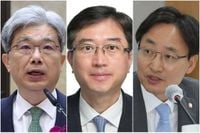On June 26, President Lee Jae-myung took a significant step in reshaping South Korea's constitutional and tax administration landscape by nominating three prominent figures for key government positions. Kim Sang-hwan, a former Supreme Court Justice with extensive experience in constitutional law, was nominated as the new President of the Constitutional Court. Alongside him, Oh Young-jun, a distinguished judge from the Seoul High Court, was selected as a candidate for Constitutional Court Justice. Additionally, Lim Gwang-hyun, a Democratic Party lawmaker and seasoned tax expert, was nominated as the Commissioner of the National Tax Service.
These nominations mark the new administration's commitment to restoring stability and public trust in the Constitutional Court, which has faced turbulence in recent years. Kang Hoon-sik, the Presidential Chief of Staff, announced the appointments during an afternoon press briefing, highlighting the nominees' qualifications and the administration's vision for a more independent and respected judiciary.
Kim Sang-hwan’s career is a testament to his deep expertise in constitutional and legal theory. A graduate of Seoul National University Law School, Kim has held prestigious roles including Supreme Court Justice, Head of the Court Administration Agency, and Chief Judge of the Seoul Central District Court. He also served as a Constitutional Court Researcher and visiting professor at Jeju National University Law School. Kang described Kim as "a judge who served as Constitutional Court Researcher and Supreme Court Justice, known for his profound knowledge in constitutional and legal theory," adding that he is "the right person to bring insight to constitutional interpretation based on a deep understanding of our society." Kim's appointment is seen as a pivotal move to reinforce the Constitutional Court’s role in upholding the constitution and ensuring judicial independence.
Oh Young-jun, nominated as a Constitutional Court Justice candidate, also boasts an impressive judicial background. Like Kim, Oh graduated from Seoul National University Law School and began his judicial career in 1994 at the Seoul Civil District Court. His career path includes serving as Senior Judge Researcher and Chief Judge Researcher at the Supreme Court, as well as holding positions at the Seoul High Court and the Patent Court. Kang praised Oh as "an excellent judge within the judiciary who will deepen the Constitutional Court's judgments," emphasizing his reputation as one of the judiciary’s most outstanding figures.
The administration views these judicial appointments as the "first step to restore the Constitutional Court," aiming to end the instability that had previously shaken the institution. Kang remarked, "This personnel decision aims to stop the Constitutional Court's turmoil at a dangerous level and enhance public trust and independence in constitutional adjudication." President Lee Jae-myung reportedly holds a firm belief that the "Candlelight Revolution," a movement that reflected the people's demand for democratic reform, is rooted in the spirit of the Constitution. Kang conveyed the president’s hope that the new appointments will play "a significant role in better constitutional interpretation," fulfilling the public’s aspirations for change and enriching the constitutional framework.
On the fiscal front, Lim Gwang-hyun was nominated as the Commissioner of the National Tax Service, a position at the vice-ministerial level. Lim, a Democratic Party lawmaker from Hongseong, Chungnam, graduated from Yonsei University with a degree in Economics and passed the 38th Administrative Examination, entering public service. He has served as Deputy Commissioner of the National Tax Service, Chief of the Seoul Regional Tax Office, and Chief of the Seoul Regional Tax Office Investigation Bureau 1. Known within the ruling party as a "tax expert," Lim is expected to bring his vast experience to bear on fair tax administration and taxpayer protection.
Kang highlighted Lim’s qualifications, stating, "He is an administrative tax expert who has served as Seoul Central Regional Tax Office Chief and National Tax Service Deputy Commissioner. Through his activities in the National Assembly's Planning and Finance Committee, he has gained a broader perspective and will contribute to fair tax administration and protecting taxpayers." Lim’s appointment reflects the administration’s focus on ensuring transparency and fairness in tax matters, which is crucial for public confidence and economic stability.
One notable development in the nomination process was the voluntary withdrawal of lawyer Lee Seung-yeop, who had been considered as a candidate for Constitutional Court Justice. Lee’s candidacy had sparked controversy due to allegations related to violations of the Public Official Election Act and concerns about conflicts of interest stemming from his involvement in politically sensitive trials, including those related to President Lee Jae-myung himself. When asked whether Lee had personally expressed his intention to withdraw, Kang responded, "He is an excellent person, but the candidate himself withdrew. The reason has not yet been confirmed." This withdrawal helped avoid further complications and underscored the administration’s sensitivity to maintaining the integrity of the nomination process.
All three nominees—Kim Sang-hwan, Oh Young-jun, and Lim Gwang-hyun—are now set to undergo confirmation hearings in the National Assembly, a critical step before they can officially assume their roles. These hearings will scrutinize their qualifications, past records, and suitability for these influential positions.
President Lee’s nominations come at a time when South Korea is seeking to strengthen its democratic institutions and reassure the public of the judiciary's independence and fairness. The Constitutional Court, in particular, has been under intense scrutiny due to past controversies and political pressures. By appointing figures with solid legal pedigrees and reputations for integrity, the administration aims to restore confidence in this vital institution.
Moreover, the appointment of Lim Gwang-hyun to lead the National Tax Service signals a commitment to enhancing tax administration's professionalism and fairness. Given the importance of tax policy in economic governance and social equity, Lim’s expertise is expected to play a key role in shaping tax enforcement and reform efforts.
These appointments reflect a broader strategy by President Lee’s government to place experienced, respected professionals in pivotal roles, signaling a return to stability and principled governance. As the nominees prepare to face the National Assembly’s scrutiny, all eyes will be on how these changes impact South Korea’s legal and fiscal landscapes in the months and years ahead.

